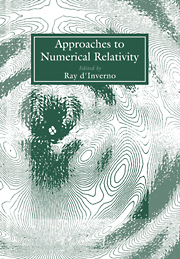Book contents
- Frontmatter
- Contents
- Contributors
- Introduction
- Preface
- PART A THEORETICAL APPROACHES
- Numerical relativity on a transputer array
- Some aspects of the characteristic initial value problem in numerical relativity
- The characteristic initial value problem in general relativity
- Algebraic approach to the characteristic initial value problem in general relativity
- On hyperboloidal hypersurfaces
- The initial value problem on null cones
- Introduction to dual-null dynamics
- On colliding plane wave space-times
- Boundary conditions for the momentum constraint
- On the choice of matter model in general relativity
- A mathematical approach to numerical relativity
- Making sense of the effects of rotation in general relativity
- Stability of charged boson stars and catastrophe theory
- PART B PRACTICAL APPROACHES
- PANEL DISCUSSION
Some aspects of the characteristic initial value problem in numerical relativity
Published online by Cambridge University Press: 15 December 2009
- Frontmatter
- Contents
- Contributors
- Introduction
- Preface
- PART A THEORETICAL APPROACHES
- Numerical relativity on a transputer array
- Some aspects of the characteristic initial value problem in numerical relativity
- The characteristic initial value problem in general relativity
- Algebraic approach to the characteristic initial value problem in general relativity
- On hyperboloidal hypersurfaces
- The initial value problem on null cones
- Introduction to dual-null dynamics
- On colliding plane wave space-times
- Boundary conditions for the momentum constraint
- On the choice of matter model in general relativity
- A mathematical approach to numerical relativity
- Making sense of the effects of rotation in general relativity
- Stability of charged boson stars and catastrophe theory
- PART B PRACTICAL APPROACHES
- PANEL DISCUSSION
Summary
Abstract. This paper is concerned with the axisymmetric characteristic initial value problem (CIVP). Tests on the accuracy and evolution stability of the code are described. The results compare reasonably well with expectations from numerical analysis. It is shown explicitly how to compactify CIVP coordinates so that a finite grid extends to future null infinity. We also investigate the feasibility of interfacing Cauchy algorithms in a central region with CIVP algorithms in the external vacuum.
INTRODUCTION
The construction of a new generation of gravitational wave detectors has important implications for numerical relativity. LIGO (Laser Interferometry Gravitational Observatory) is likely to detect gravitational waves from various astrophysical events within the next few years. Numerical relativity will be the main tool for interpreting such data, and will need to be able to calculate waveforms at infinity as accurately as possible. Much work on numerical relativity has been based on the standard 3 + 1 Cauchy problem, where data is specified on a spacelike hypersurface and then evolved to the future. An alternative approach is the characteristic initial value problem (CIVP) based on a 2 + 2 decomposition of space-time. It would seem that the CIVP is more appropriate in vacuum, but that it loses this advantage in the presence of matter, whose characteristics do not coincide with those of the gravitational field. Another consideration is the present state of development of numerical codes.
Information
- Type
- Chapter
- Information
- Approaches to Numerical Relativity , pp. 20 - 33Publisher: Cambridge University PressPrint publication year: 1992
Accessibility standard: Unknown
- 8
- Cited by
